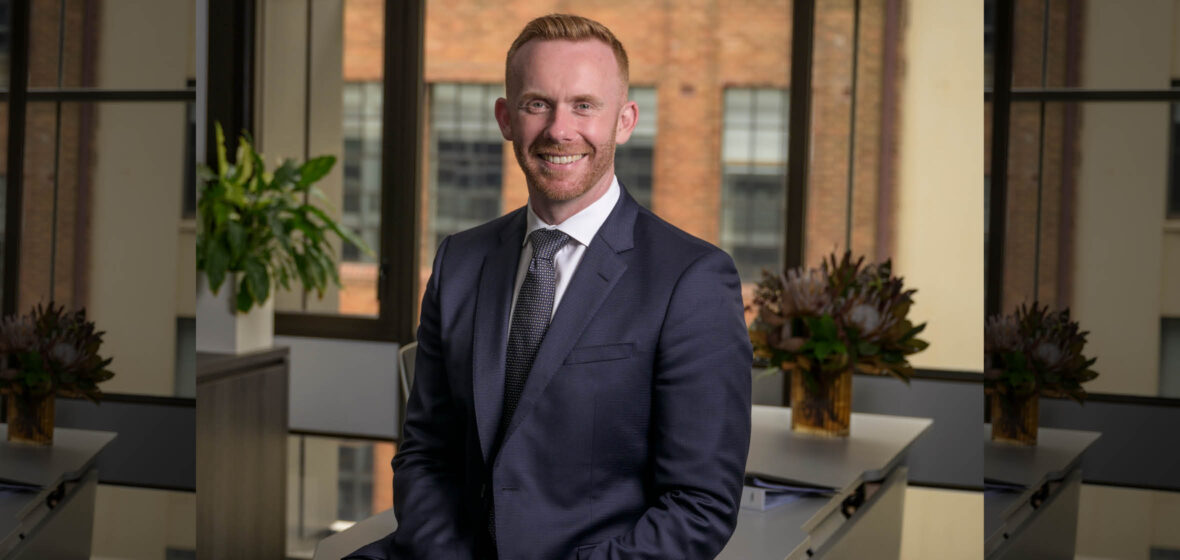At what seems to be a crossroad moment for the profession, Brett McGrath starts his presidency with confidence and optimism. He sat down with LSJ for lunch to talk about his priorities for the year, and how the Law Society can help its members prepare for the future.
The most important advice Brett McGrath received from past Law Society presidents was to enjoy “every minute” of the role.
“It’s only one year for the President; my role is to amplify the best of the profession, what the Law Society can offer to the profession, as well as to advocate for the profession and the rule of law.”
Originally from the Macarthur region, McGrath is the first Western Sydney University graduate to become President of the Law Society, a clear sign the profession is diversifying. “When I was lecturing at Western Sydney University, I had students say to me “No one from Western Sydney will become a judge.” he says. “At that stage, there hadn’t, but that was about 10 years ago. Now, they’ve had three or four magistrates appointed. And then you’ve got President of the Law Society.”
McGrath is acutely aware that his Presidency starts at a crucial time for the profession. Last year, private practices achieved gender parity for the first time. McGrath says more people from diverse backgrounds, whose English is a second language, are sworn in. “There are those barriers that are being broken through every single day. And it’s an exciting time to be in the profession because rarely are you on the ground floor to see it evolve.”
“I certainly hope that members realise, and see day-to-day, that the profession is becoming more diverse and more accessible for all members of the community. “
Accessibility and democratisation of the profession are essential topics for McGrath. He jokes that his first contact with the law was during his parent’s separation. “It’s a really uncomfortable situation to be in for people, so I was impressed with how lawyers could guide and navigate people through those difficult phases in their lives; they became trusted advisors.”
This interaction was essential to the young McGrath, who was a couple of years after high school and still undecided about what to do. As he says, he was impressed by the impact lawyers have on daily life and the importance “in the fabric of society”.
“And that’s one of the priorities for this year”, he says. “To demonstrate that, as lawyers, we rent out a service not only to our clients and the profession but to the community at large to show our outsized impact.”
The Law Society, says McGrath, is dedicated to campaigning the role of lawyers, offering tools that help solicitors in their day-to-day roles while reinforcing the importance of doing pro-bono work. “While the large firms are wonderful with their pro bono work, we want to pay attention to what the practitioner in Cooma is doing who may not necessarily tally the work up. We need to recognise that is occurring in local communities.”
“We take that burden and bring that to people by giving them a sense of hope, bringing clarity or searching for truth. That’s what we do day to day as solicitors and professionals.”
Artificial Intelligence is another concern that is rapidly transforming the profession, and McGrath has made it one of the priorities of his Presidency. It’s a subject that unexpectedly became a hot topic during President Cassandra Banks’ term last year, that McGrath sees as one of the biggest challenges for the future of the law.
He reveals the establishment of an AI Task Force that can anticipate how it will impact the profession and the members of the Law Society. He pictures a task force compiled by academics and experts in law and ethics, meeting several times throughout the year.
“Everyone in the law globally is talking about the impact it will have on the profession and how we work as solicitors and companies. I mean, every profession is looking at this right now, including the courts, so we’ve got to focus on that and how using generative AI programs is going to be put into place.”
“The ethics around it, the need to be transparent about its use, client expectations, and how that will impact business models as well. If you’re using generative AI, will the client start to question the billable hour and its value? We’re looking at all these questions, so everything is on the table.”
Another priority concerns supporting members at the end of their careers. McGrath believes there’s immeasurable value experienced solicitors have for the new generation. “Retirement is often a scary thing for people to enter into because the profession has been so intrinsic to their identity, their whole lives.”
“We want members to feel like we’re looking at programs and what we can do to help solicitors at the end of their career; it’s not the end of them in what they contribute to society.”
“We’re actively thinking about how we can assist in succession planning and mentoring opportunities for retired practitioners, [as well as] models of phasing out of work. It’s thinking very deeply about what opportunities there are to continue serving the professional community.”
Every question we ask McGrath is welcomed with layers of pulsating ideas on how to improve the profession and how to anticipate the obstacles facing the future of the Law Society membership. But it’s all framed in the philosophy that lawyers are crucial to their community, and the Law Society’s goal is to aid and facilitate that improvement.
“Everyone looks up to lawyers. It’s the old adage – What do you want your child to be? A doctor or a lawyer? There was always a prestige around being in the legal profession.”
“We take that burden and bring that to people by giving them a sense of hope, bringing clarity or searching for truth. That’s what we do day to day as solicitors and professionals. We may not see it in that blue sky sort of sense, but that’s a critical role that we’ve got, and we’re trusted to do it.”
With that mindset, McGrath chose United Way Australia as the 2024 President’s Charity. They run the Dolly Parton’s Imagination Library program in Australia that inspires children before their schooling years by encouraging a love of reading.
“Reading a book stimulates and generates your imagination and gets your creative juices flowing. You have to think critically, ponder around it,” he says.
“That’s why United Way’s focus on early childhood literacy is a wonderful shift away from what I usually do in law daily. Reading has offered me so much in life.”
The curious irony of finishing the conversation with McGrath about books is that speaking to him, he comes across as a genuine open book. There is a sense of duty in his task that he also finds part of the DNA of all solicitors.
“You never stop being a lawyer. And it’s not a job you can say, ‘I’m going to shut my emails off now’. It’s part of a bigger profession and a way of life. That’s what being a solicitor is.”




